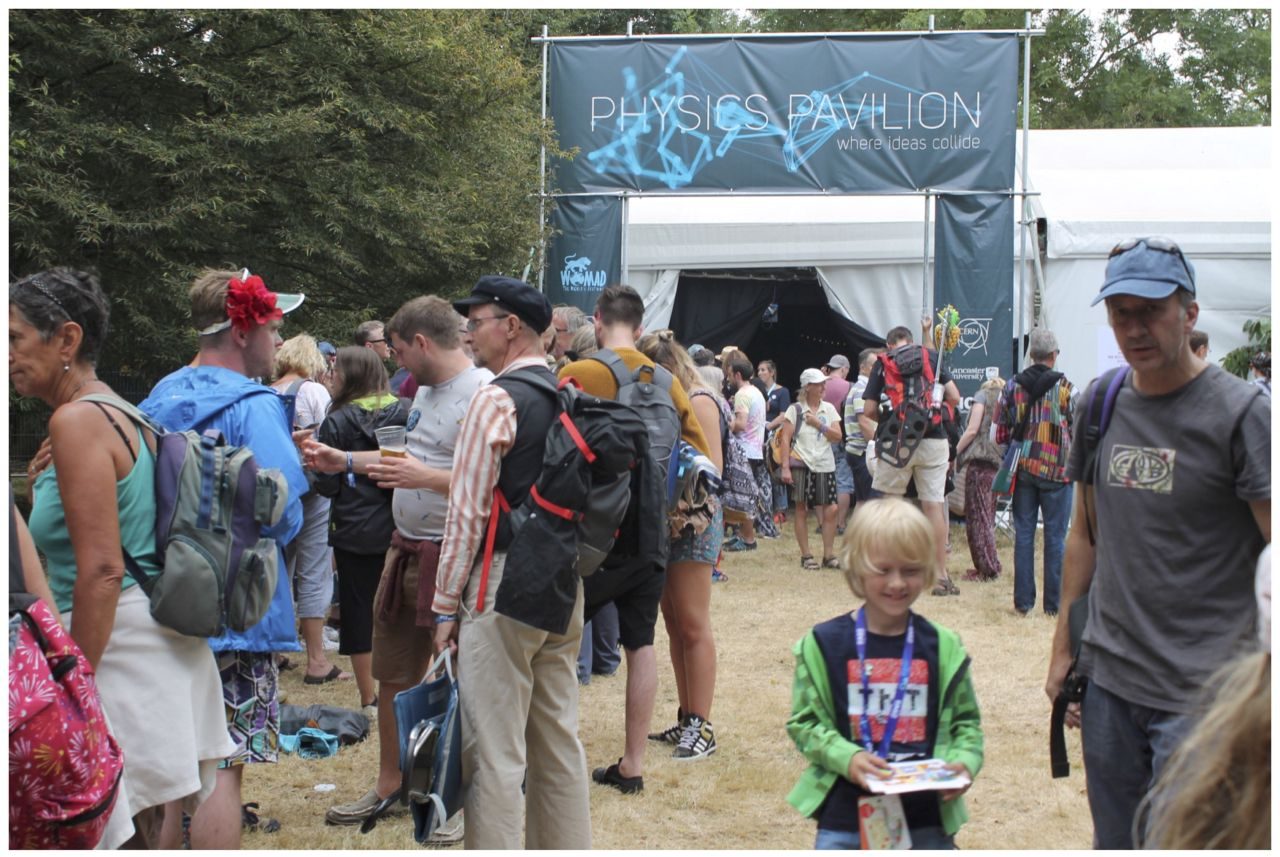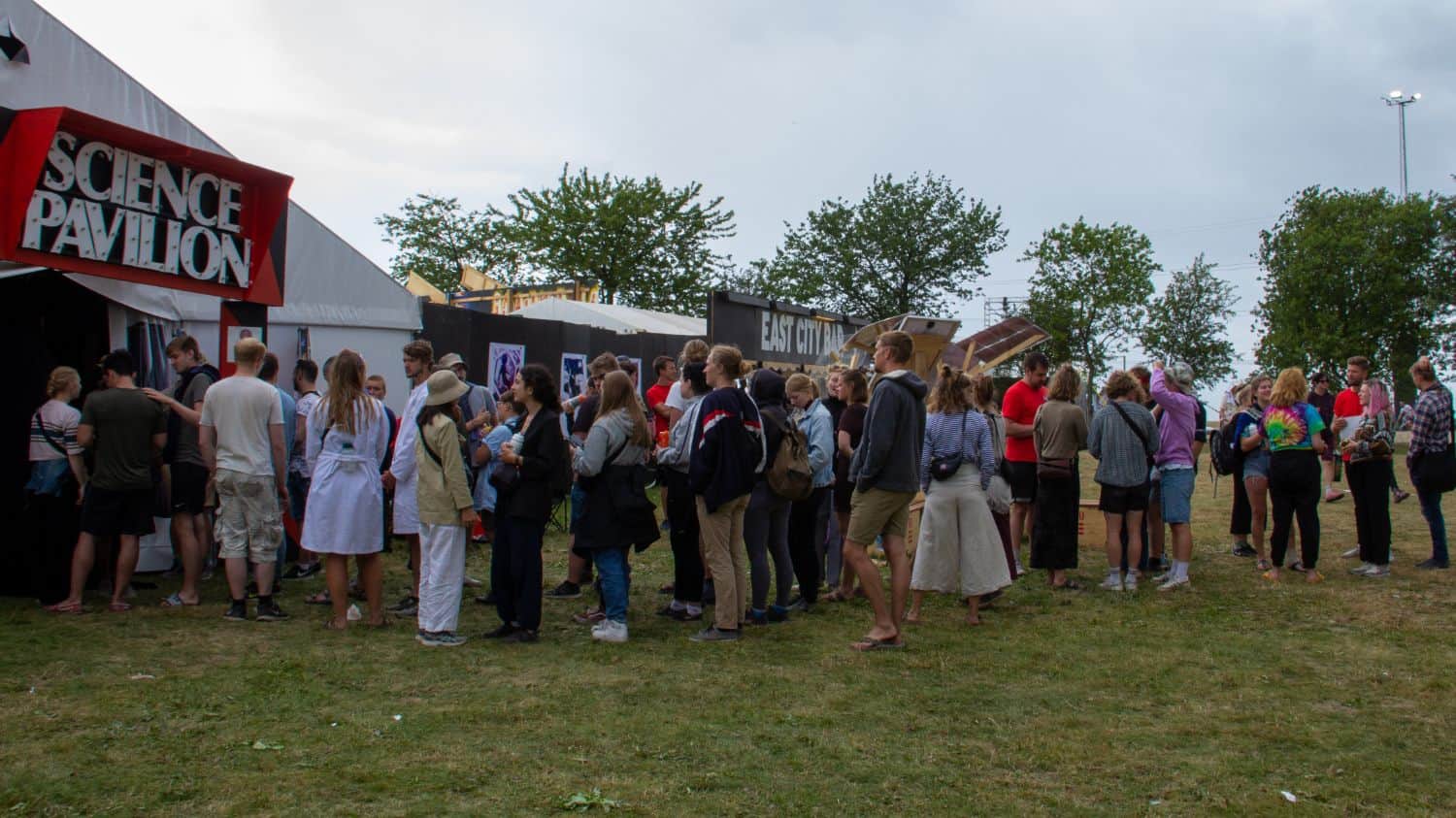The mathematician and presenter of the TVE programme ‘Órbita Laika’, Eduardo Sáenz de Cabezón, is part of the team of science communicators who will guide the area’s activities.
Almost twenty activities, including talks, workshops and shows (with three sessions each day) make up the schedule of the Discovery Lab, a new space dedicated to science in the heart of the Rototom Sunsplash venue, reflecting the first collaboration between CERN, one of the most prestigious international research centres in the world, based in Switzerland, and a Spanish festival.
From a didactic perspective, in an agile format (30-minute sessions with another 10 minutes of feedback with the public) with experienced guides from the relevant scientific fields leading each activity. Such as the professor of the University of La Rioja, mathematician and presenter of the TVE programme ‘Órbita Laika‘, Eduardo Sáenz de Cabezón. All of whom will take us on an eclectic journey through science. Discovery Lab will have the Valencian comedian and monologist Arnau Soler as a special guest MC to present the different sessions.

On the first day, Friday 16 August, the talk “Wave or particle” will be given by Alberto Aparici, head of dissemination and promotion at the Institute of Corpuscular Physics (IFIC) of the CSIC and the University of Valencia. This will be followed by another talk, “From X-rays to mobile phones: CERN is not just fundamental physics”. An invitation to discover the science that lies in small everyday objects, such as the tech that make our lives easier and more fun, as told by the engineer, physicist and part of the CERN team, Isabel Béjar Alonso. The show “Big Van Show”, with monologues by Eduardo Sáenz De Cabezón and Manuel González, head of Plans and Programmes Management at the Parque de las Ciencias in Granada, where he coordinates an educational project, will close this first Discovery Lab connection with the Rototom audience.
“How to win at everything” is the name of the workshop that will open the day on Saturday 17, led by the presenter of “Órbita Laika”. This will be followed by two talks. One of them will address, from the case of Levante CF, “How science gives football an advantage”, with José Calabuig Rodríguez, director of the University Institute of Pure and Applied Mathematics (IUMPA) of the Universitat Politècnica de València (UPV). And a second, and very musical one, under the title “Telescopes from yesterday, today and always” which, together with Manuel González, will review some of the telescopes that have given scientists most joy in recent times since, in the summer of 1623, Galileo pointed to the sky with the first of them.
Learning how to build your own solar charger will be the challenge of the workshop that will open the Discovery Lab triple session on 18 August, with Iván López, researcher at the Barcelona Institute of Microelectronics (IMB-CNM). Places for this activity are limited, and the public should collect their tickets 30 minutes beforehand at the entrance to the space. Doing their part, Héctor David Regules and Yael Vázquez will be in charge of the show “The cosmic piano”, designed to detect elementary particles called muons and generated by the arrival of cosmic rays to Earth, and with which a randomly composed melody can be created due to the nature of cosmic rays. The programme will be completed by the workshop “The score of juggling: siteswaps and mathematics”, in which the musician Bernat Cucarella Sifre will show how juggling tricks can be written down to remember them in time or how to ‘write’ combinations of shots at basket using siteswaps, which describe juggling patterns.
At the halfway point of the festival (19 August) Discovery Lab will raise the curtain with the workshop “From the Abacus to the Quantum Computer”, led by María Alandes, head of the Scientific Computing Resource Accounting System at CERN. Together with this expert, the public will discover how humans went from performing basic operations with the abacus to handling qbits in complex quantum computers, and how advances in physics have contributed to the evolution of computing.
“Einstein for the perplexed” is the talk that science pormoter José Daniel Edelstein, professor of physics at the University of Santiago and researcher at the Galician Institute of High Energy Physics, will give to analyse how Albert Einstein changed the way we understand space and time, mass and energy, light and matter. From his theories we can deduce the expansion of the Universe, the relativity of time and the strangest creatures in the cosmos: black holes.
Eduardo Sáenz De Cabezón will close the daily agenda with the talk “The mirage of the majority”. In it, he will discuss how mathematics can help us to understand our collective behaviour, as in social networks. The structure of the networks and the algorithms that regulate the information we receive and send sometimes lead to unexpected phenomena, which are not always positive, so knowing them can help us to have a better experience when accessing social networks. “In this endeavour, mathematics is an irreplaceable ally,” he says.
On Tuesday 20 August the Discovery Lab programme will include the talk “Why did the dinosaurs become extinct”, with Vicent J. Martínez, and “The awakening of the monster Cthulhu”, with Cristina Romera-Castillo, oceanographer at the Institute of Marine Sciences of Barcelona (ICM-CSIS). The closing day of the new space, on the 21st, will feature a new workshop on the self-building of solar chargers and the talk “The frontier of space and time photographed with the Event Horizon Telescope (EHT)”, with astronomer Iván Martí-Vidal, who will talk about black holes, those “fascinating places, where time and space behave in an extraordinary way”, and will share, for discussion, the images of black holes obtained with the Event Horizon Telescope (EHT) “with the aim of seeing what we can learn from them”.

CERN has been promoting this initiative in other European countries for six years with its ‘Festival Programme’, a collaboration between the research centre, a festival and partner institutes in the host country to reach new non-scientific audiences at music and cultural events.
In 2024, this scientific and informative project crosses the Pyrenees for the first time and comes to Spain as part of the Rototom Sunsplash. A move made possible thanks to the commitment of the CERN and Society Foundation; the coordinator of its ‘Festival Programme’, Connie Potter, and The Big Bang Collective; and the involvement, in Spain, of the Institute of Corpuscular Physics (IFIC) of the CSIC and the University of Valencia, the Institute of Microelectronics of Barcelona (IMB-CNM), and the University of La Rioja.
